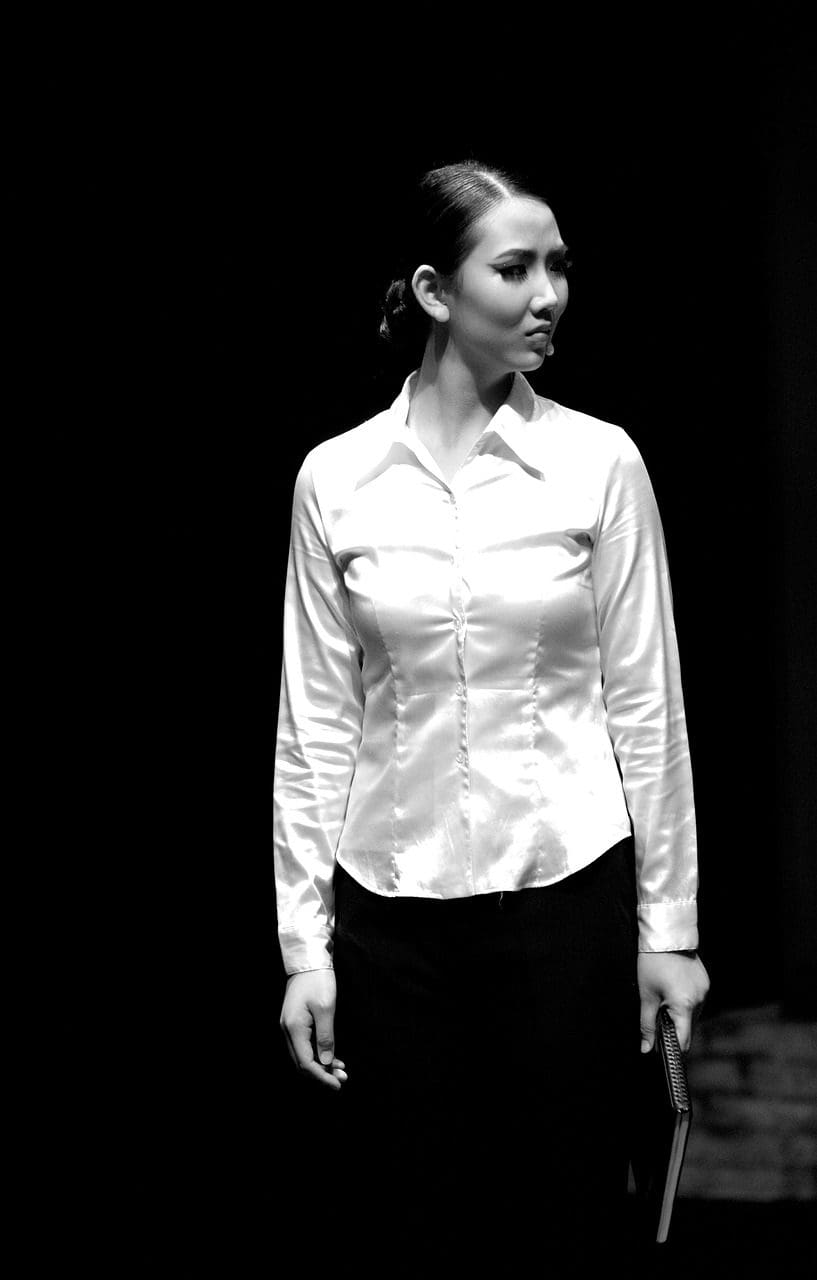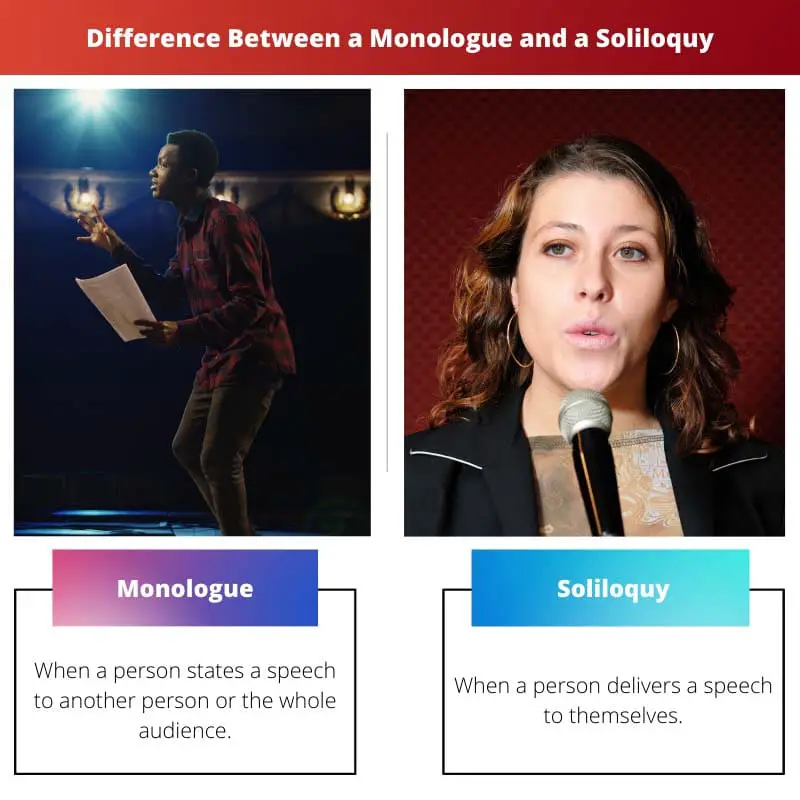A monologue is a single character’s speech to another character or the audience. A soliloquy is a self-initiated speech.
The main distinction between a soliloquy and a monologue is that a monologue is intended to be heard by others, whereas a soliloquy is a presentation of the character’s thoughts.
Key Takeaways
- Monologues address other characters or the audience, while soliloquies feature a character speaking their thoughts aloud with no intended listener.
- Monologues advance the plot or reveal important information, whereas soliloquies provide insight into a character’s emotions, motives, or internal conflicts.
- Monologues can be found in various forms of media, including theater, film, and television; soliloquies are predominantly theatrical devices used in plays.
Monologue vs Soliloquy
The difference between a monologue and a soliloquy is that several characters appear in the monologue. However, on the contrary, only one character is present in a soliloquy. Two types of audiences attend a monologue. They might play the role of the audience in a drama, or they can be real spectators or audiences. A soliloquy does not involve any form of the audience; nonetheless, the real audience who sits in the theatre to see the play is present.

A monologue occurs when someone delivers a speech to another person or the entire audience. There are two categories of people who attend a monologue. They might either be part of a drama’s audience or real-life viewers or audience.
A monologue occurs when a character addresses another character without receiving a response. The monologue is derived from a combination of two Greek words, monos and legein; Monos means ‘single’ or ‘solitary,’ and legein means ‘to talk.’
A soliloquy occurs when a person speaks to themselves. In a soliloquy, there is no such thing as an audience, although there is an actual audience who sits in the theatre and watches the performance.
The innermost thoughts and views of a person, as well as their objectives and motives, are expressed in Soliloquy. A soliloquy is derived from two Latin words, Solus and loqui, both of which imply “to talk” and “alone.”
Comparison Table
| Parameters of Comparison | Monologue | Soliloquy |
|---|---|---|
| Definition | When a person states a speech to another person or the whole audience. | When a person delivers a speech to themselves. |
| Audience involved | Two types, audience in the play and the theatre. | No audience in the drama, only in theatres. |
| Number of characters | More than one character. | Only one character is present. |
| Characteristic | It’s a Monologue. When the character speaks to the opposite character, he does not get a response in return. | In Soliloquy, a person’s innermost thoughts and beliefs are stated, including their intentions and motives. |
| Origin of word | Greek words, Monos (single) and legein (to speak). | Latin words, solus (alone) and loqui (to speak) |
What is Monologue?
A monologue is a speech delivered by a character to the audience or other characters to communicate his feelings. Monologues are used frequently in both dramatic (films, plays, etc.) and non-dramatic (poetry) media.
Dramatic monologues and inner monologues are the two sorts of monologues that exist.
An interior monologue occurs when a character externalises their ideas to the audience, allowing the audience to comprehend experiences that would otherwise be primarily internal.
One character speaks to another in a dramatic monologue. A monologue occurs when a person delivers a speech to another person or the entire audience.
There are multiple characters in the monologue. A monologue occurs when a character speaks to the opposing character without receiving a response.
The monologue is derived from the combination of two Greek words, monos and legein, where Monos means “single” or “solitary,” and legein means “to talk.”

What is Soliloquy?
A soliloquy occurs when a person delivers a speech to themselves. Only one character appears in a soliloquy. In a soliloquy, a person expresses their innermost thoughts and ideas, as well as their intentions and motives.
The word soliloquy is derived from two Latin words, Solus and loqui, which mean ‘to talk’ and ‘alone,’ respectively. A soliloquy is a dramatic device in which a character converses with themselves, exposing their innermost thoughts.
Dramatists utilise this technique to depict characters’ thoughts that would otherwise be hidden from the audience. Soliloquies were once popular in the theatre, but they fell out of favour as the drama moved toward realism in the late 1800s.
Soliloquies are used in several of Shakespeare’s tragedies to depict the inner thoughts and conflicts of tragic heroes such as Macbeth, Othello, and Hamlet.

Main Differences Between Monologue and Soliloquy
- When a person gives a speech to another person or the whole audience, then it’s called a monologue. On the other hand, when a person gives a speech to herself or himself, then it is called a Soliloquy.
- The audience involved in monologue is of two types. Either they can be the audience within a drama, or they can be real viewers or the audience as well. On the other hand, there is no such involvement of any kind of audience in a soliloquy. However, the real audience who watch the play by sitting in the theatre are present.
- In the monologue, more than one characters are present. However, in a soliloquy, only one character is present.
- When the character speaks to the opposite character but does not get a response in return, then it’s a monologue. On the other hand, in Soliloquy, a person’s innermost thoughts and beliefs are stated, including his or her intentions and motives.
- The derivation of the word monologue comes from the combination of two Greek words, monos and legein, where Monos means ‘single’ or ‘solitary’, and the latter means ‘to speak’. On the other hand, the derivation of the word soliloquy is from two Latin words, Solus and loqui, which means ‘to speak’ and the former means ‘alone.




